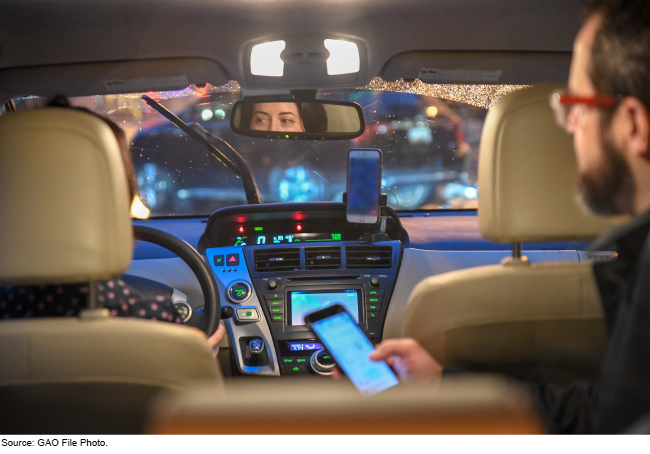Vehicle Safety: Extent of Open Recalls among Ridesharing Vehicles
Fast Facts
Ridesharing services such as Uber and Lyft connect passengers with drivers via mobile apps. Most ridesharing drivers use their personal vehicles.
All passenger vehicles can be subject to recalls—when automakers notify car owners that certain repairs are needed for safety. Most drivers aren't legally required to fix recalled cars, and ridesharing passengers don't know the recall status of their rides.
About 16% of ridesharing vehicles had open safety recalls in August 2022.
The Department of Transportation has worked with rideshare companies to raise awareness about open safety recalls.

Highlights
What GAO Found
“Ridesourcing,” also called ridesharing, involves transportation network companies such as Lyft and Uber using a digital network to connect passengers with drivers of, most commonly, personally owned vehicles. GAO estimated that nationally, nearly 1 in 6, or about 16 percent, of ridesourcing vehicles that performed a passenger trip in August 2022 had an open safety recall as of December 2022. Separately, a company that maintains a vehicle history database, CARFAX, reported about 1 in 5, or about 20 percent, of passenger vehicles nationally had an open safety recall in 2022.
Ridesourcing vehicles could differ from all U.S. passenger vehicles in ways, such as vehicle age, that may be associated with whether a safety recall is remedied. For example, the National Highway Traffic Safety Administration (NHTSA) has found that recalls for newer vehicles are generally remedied more often than recalls for older vehicles. NHTSA or a manufacturer may designate a safety recall campaign as a “Do Not Drive” recall, indicating that affected vehicles should not be driven until remedied. Of the ridesourcing vehicles with an open safety recall, GAO estimated that less than 1 percent had a recall with an urgent “Do Not Drive” designation.
An Estimated 1 in 6 Ridesourcing Vehicles Had One or More Open Safety Recalls Nationally

Public sector oversight of open safety recalls in ridesourcing vehicles is limited.
- Federal actions: Federal law does not require that vehicle owners—with the exception of rental car companies—remedy open safety recalls. However, NHTSA has worked with ridesourcing companies to raise awareness of open safety recalls in ridesourcing vehicles, according to NHTSA officials.
- State actions: Of six selected states, one, Maryland, requires that a vehicle used for ridesourcing be certified annually as not having any open safety recalls. Representatives from safety and mobility organizations and an association; representatives from two ridesourcing companies; and NHTSA officials told us that Maryland is the only state they knew of with a requirement specific to open safety recalls on ridesourcing vehicles.
- Local actions: Officials from all five localities GAO interviewed said they do not have requirements specific to open safety recalls on ridesourcing vehicles.
On the private sector side, selected ridesourcing companies told GAO they took some steps related to recalls. These steps included (1) suspending vehicles with an open “Do Not Drive” recall from their platforms until the recall is remedied, (2) periodically sharing notices about major recalls with drivers, and (3) including a statement in companies' terms of service that drivers are to monitor and repair any open safety recalls.
Why GAO Did This Study
As with all passenger vehicles, ridesourcing vehicles can have unrepaired, or open, safety recalls, which could expose customers in these vehicles unknowingly to safety risks.
The Infrastructure Investment and Jobs Act includes a provision for GAO to study the extent of open recalls in passenger vehicles used for ridesourcing. This report describes (1) how many vehicles used for ridesourcing had open safety recalls and (2) public and private sector roles in overseeing safety recalls in vehicles used for ridesourcing.
GAO obtained confidential data from ridesourcing companies Lyft and Uber, which represent the vast majority of the U.S. market, for vehicles that completed a passenger trip in August 2022, the most recent month of trips at the time we requested data. GAO used tools made available by CARFAX and NHTSA to analyze whether these vehicles had open safety recalls as of December 2022. GAO used the CARFAX tool for about 98 percent of the vehicles. For the remainder, GAO used a sampling method and the NHTSA search tool for a manufacturer that does not participate with CARFAX.
Additionally, GAO (1) reviewed NHTSA documents and interviewed NHTSA officials; (2) interviewed officials from six states and five localities that may have collected data on ridesourcing vehicles or were among top ridesourcing markets; and (3) interviewed representatives from four ridesourcing companies selected based on market share and operation in selected states and localities.
For more information, contact Elizabeth Repko at (202) 512-2834 or repkoe@gao.gov.
